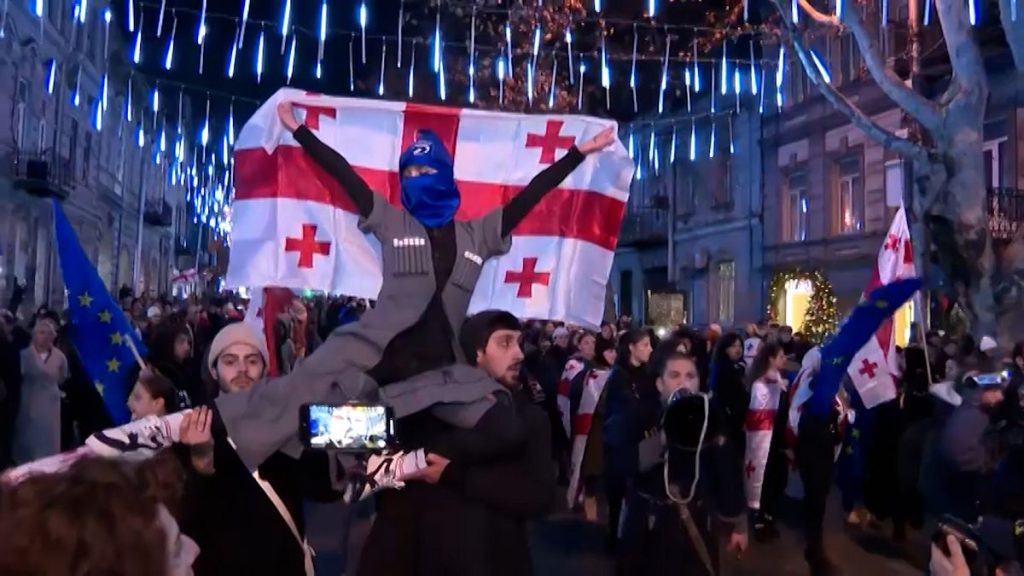The Georgian protests, ignited by the postponement of the country’s EU bid to 2028, have evolved into a potent expression of popular discontent, demanding substantial political reforms. Initiated on November 28th, the demonstrations have sustained momentum for nearly a month, attracting a diverse coalition of citizens united by their aspiration for a more democratic and European-aligned future. Students, professionals, women’s groups, and even performers of traditional Georgian dance have converged in a vibrant display of solidarity, demanding early parliamentary elections, the release of detained protesters, and a decisive shift towards European integration. This sustained public pressure underscores a deep-seated desire for political change and a rejection of the current government’s trajectory.
The postponement of Georgia’s EU application served as the immediate catalyst for the protests, but the underlying grievances extend far beyond this single event. The demonstrations reflect a broader frustration with the perceived stagnation of democratic processes, restrictions on civil liberties, and a sense of disconnect between the government and the aspirations of its citizens. The demand for new elections signifies a lack of confidence in the current political landscape and a desire for a more representative government that can effectively address the nation’s challenges and steer it towards a European future. The release of detained protesters has become a rallying cry, symbolizing the struggle for freedom of expression and assembly, fundamental rights considered essential for a thriving democracy.
The “Unity March” on December 25th marked a pivotal moment in the protests, showcasing the inclusive nature of the movement and its broad appeal across ethnic and social divides. Armenians, Azerbaijanis, and other national minorities joined the predominantly Georgian demonstrators, underscoring the shared desire for a better future for all citizens of Georgia, irrespective of their background. This powerful demonstration of cross-cultural solidarity amplified the message of the protests, presenting a united front against perceived political injustices and demanding a more inclusive and equitable society. The participation of minorities highlights the universality of the call for political reform and a future rooted in European values, demonstrating that the desire for change transcends ethnic and cultural boundaries.
The participation of national minorities in the “Unity March” carries significant implications for the future of Georgia. It signals a potential shift in the political landscape, where ethnic divisions are being bridged by a shared vision of a more democratic and prosperous nation. This unity poses a formidable challenge to the existing power structures and underscores the growing demand for a government that is truly representative of all its citizens. The inclusion of diverse voices in the movement strengthens its legitimacy and broadens its appeal, putting greater pressure on the government to address the demands of the protesters. The “Unity March” vividly illustrates that the desire for change extends beyond the majority population and encompasses a diverse range of groups who share a common aspiration for a more just and equitable society.
The unwavering commitment of the protesters, the president, and the opposition parties creates a complex and volatile political dynamic. All sides appear resolute in their stances, signaling a protracted struggle for political power and influence. The protests have exposed deep fissures within Georgian society, highlighting the urgent need for dialogue and compromise. The government’s response to the protests will be critical in determining the future trajectory of the nation. A heavy-handed approach risks escalating tensions and further alienating the population, while a genuine effort to address the protesters’ concerns could pave the way for a more inclusive and democratic future. The current stalemate underscores the fragility of the political situation and the urgent need for a peaceful resolution that respects the rights and aspirations of all citizens.
The Georgian protests represent a pivotal moment in the country’s history, a crossroads where the path forward remains uncertain. The sustained demonstrations, the participation of diverse groups, and the unwavering demands for political change signal a deep-seated desire for a more democratic and European-oriented future. The outcome of this struggle will have profound implications for the future of Georgia, shaping its political landscape, its relationship with Europe, and its identity as a nation. The coming weeks and months will be crucial in determining whether Georgia can navigate this turbulent period and emerge as a stronger, more united, and more democratic society. The protests serve as a powerful reminder of the enduring human aspiration for freedom, justice, and self-determination, and the crucial role of citizen engagement in shaping the destiny of a nation.














